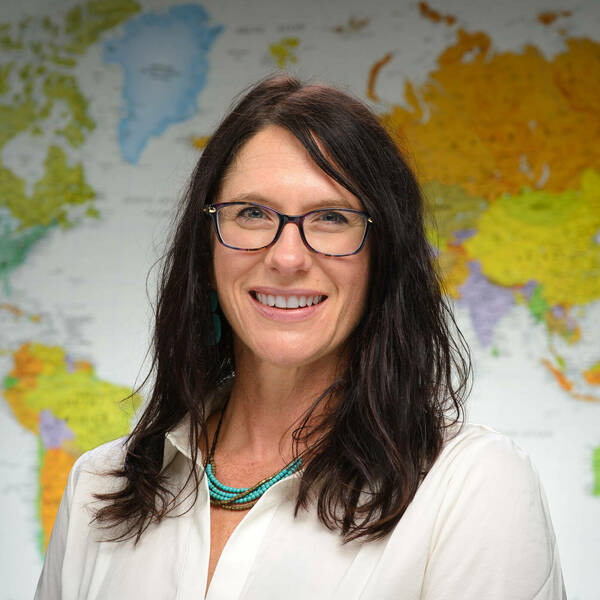Pulte Director Presents at National Academies Event on Housing and Disasters

As the world grapples with the accelerating impacts of climate change, disaster preparedness and recovery strategies are shifting to meet the demands of a more volatile and interconnected landscape. Traditional frameworks that treat disasters as isolated events are now outdated in the face of back-to-back catastrophes, where regions barely have time to recover before the next blow. These "compounding disasters" create new challenges, with infrastructure and communities struggling to withstand the cumulative effects. This evolving reality calls for bold, innovative thinking and transformative leadership.
Dr. Tracy Kijewski-Correa, the William J. Pulte Director of the Pulte Institute for Global Development at the University of Notre Dame’s Keough School of Global Affairs, is at the forefront of this movement. As a distinguished professor of Civil Engineering and Global Affairs, Kijewski-Correa’s research centers on enhancing the resilience and sustainability of communities vulnerable to climate hazards. With a specialized focus on disaster risk reduction and climate adaptation, her work pushes the boundaries of engineering and policy to ensure that vulnerable populations have the shelter and security they need amid escalating threats.
Kijewski-Correa’s expertise in infrastructure resilience and her leadership in mobilizing engineering networks globally garnered her a spot in a recent edition of the Climate Conversations: Pathways to Action series hosted by the National Academies of Sciences, Engineering, and Medicine. This monthly webinar series convenes experts to discuss high-level strategies for addressing climate change and its myriad impacts. In a session moderated by Christopher Flavelle of The New York Times, Kijewski-Correa was joined Carlos Martín of Harvard University in a discussion on housing resilience, access, and the urgent need to redesign our disaster frameworks for a new reality of persistent, overlapping crises.
The event explored questions that sit at the heart of Kijewski-Correa’s work: How can we build housing that withstands not just one storm but a series of disasters? What strategies are needed to ensure housing remains a source of stability for those at risk? These questions reflect her commitment to addressing some of the world’s most complex and interconnected challenges.
In addition to her role at the Pulte Institute, Kijewski-Correa serves as the inaugural director of the Structural Extreme Event Reconnaissance (StEER) network, a collaborative initiative that leverages global engineering expertise to evaluate the impacts of extreme weather events on communities. Through StEER, she has mobilized teams of engineers to assess disaster-affected areas worldwide, gathering data that will shape future policy and disaster response frameworks. Her hands-on approach underscores her dedication to creating practical, research-backed solutions that improve lives on the ground.
By participating in this timely and prominent conversation, Kijewski-Correa continues to champion a vision for resilient housing that adapts to a changing climate and meets the needs of at-risk communities. Her expertise will no doubt shed light on the path forward, as policymakers, communities, and researchers strive to build a safer, more sustainable future for all.
View the event recording below:
Originally published by at pulte.nd.edu on November 04, 2024.
Latest Research
- University of Notre Dame and IBM Research build tools for AI governanceMain Building (Photo by Matt Cashore/University of Notre Dame) …
- Smarter tools for policymakers: Notre Dame researchers target urban carbon emissions, building by buildingCarbon emissions continue to increase at record levels, fueling climate instability and worsening air quality conditions for billions in cities worldwide. Yet despite global commitments to carbon neutrality, urban policymakers still struggle to implement effective mitigation strategies at the city scale. Now, researchers at Notre Dame’s School of Architecture, the College of Engineering and the Lucy Family Institute for Data & Society are working to reduce carbon emissions through advanced simulations and a novel artificial intelligence-driven tool, EcoSphere.
- Seven engineering faculty named collegiate professorsSeven faculty members in the Notre Dame College of Engineering have been named collegiate professors—a prestigious title awarded by the university and college in recognition of excellence in research, teaching and service. The designation may be conferred on faculty at the assistant, associate or…
- ‘A special challenge’: German studies scholar wins National Humanities Center fellowship for research on medieval womenFor CJ Jones, the joy of research is not the answers but the journey. And the next step on that journey is a fellowship with the National Humanities Center. …
- Notre Dame Lead Innovation Team partners with local WIC program to identify, prevent lead poisoning in childrenB.A.B.E. store “shoppers” now have something new to help their families: free lead screening kits offered by the University of Notre Dame’s Lead Innovation Team.
- Notre Dame Welcomes Ninth Cohort of Warrior-Scholars for Transformative Academic JourneyNOTRE DAME, IN – The University of Notre Dame recently concluded its ninth successful Warrior-Scholar Project (WSP) boot camp, hosting 34 dedicated Warrior-Scholars from June 21st to 28th. This intensive, week-long academic residency provided transitioning service members and veterans…













